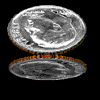|
|
|

CURRENCY IN JAPAN -- In Japan, personal checks do not exist in Japan, and although credit cards are used, they are not used commonly are not handed out like popcorn like they are in the U.S. Most transactions are in cash. Because of this, you may want to carry more cash on your person than you are used to; because of low crime rates in Japan, this is not really a problem. Japanese currency consists of 6 kinds of coins and 3 kinds of bills. Coins come in 1, 5, 10, 50, 100 and 500-yen denominations; bills in 1000, 5000, and 10,000-yen denominations. The yen, as of January 1998, was around 130 to the dollar (though it has ranged between 250 to 75 yen to the dollar over the past 15 years). At 130 yen to the dollar, 1000 yen is about $7.70, and 10,000 yen is, naturally, about $77.
Telegraphic Transfer (denshin sokin): Money is remitted from a Japanese bank and a specific bank account in your home country. It takes a week to arrive and costs approximately 5000-10,000 yen, with higher fees for sending yen.
Mail Transfer (futsu sokin): you change your money to foreign currency in Japan, and mail it overseas on a transfer statement. Upon arrival (up to 2 weeks later), your money is immediately deposited. The service charge is around 4000 yen, with higher fees for sending yen.
Transfer by Check (sokin kogitte): This is a bank check, which is sent by mail and costs about 2500 yen.
Travelers Checks (ryoko kogitte): If you are traveling back home, you may want to use these; a 1% commission is usually taken by the bank, and you can avoid remittance charges.
BANK ON JAPAN -- One of the biggest banks in the world is the Japanese Post Office. Each post office will have windows for banking purposes; it is considered to be a highly stable banking service, and is used by many Japanese people. The post office also offers ways to send money home; you may want to check with them for alternate money transfer methods. You can spot post offices by their mark: a red T with a line above it.
ginko bank kouza account tsuucho passbook yokin bank deposit chokin savings furikomi transfer kyasshu kado "cash card"; ATM card kawase reto exchange rate
Links Banks